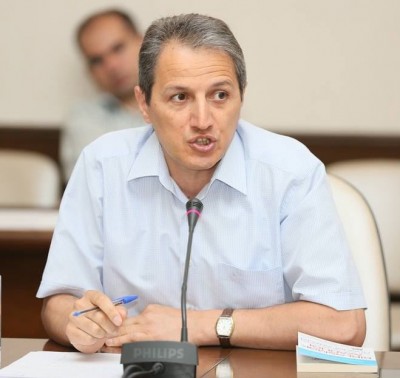REFERENDUM ACT ENDANGERS FREEDOM OF EXPRESSİON AND ACCESS TO İNFORMATİON
Alasgar Mammadli, Lawyer, 07.09.2016

Planned Referendum on September 26, 2016 for making necessary changes to the Constitution of Azerbaijani Republic, and organizing nationwide referendum requires the conduct of serious discussions in many directions. One of the directions envisions challenges brought up by the new Referendum Act on freedom of expression and access to information.
The new Act suggests amendments to the Constitution and proposes 29 different changes and provisions. 14 of them are directly targeting Chapter III of the Constitution which is about fundamental human rights and freedoms. The main feature of this chapter is immunity, therefore making protection from external influences is an integral part of the Constitution. Article 155 of the Constitution restricts any recommendation initiatives on the amendments brought to the referendum. It creates immunity by stating that "Cancellation or limitations of any human rights and freedoms considered on Chapter III of the Constitution that are specified at international conventions ratified by Azerbaijan Republic, cannot be taken to referendum.”
Changes and additions made to Article 32 on the right to privacy, Article 47 on expression of thought, Article 49 on freedom of assembly, Article 57 on the right to appeal, Article 59 on the right of association, as well as Articles 68 and 71, are directly or indirectly affecting the freedom of expression and access to information.
The sixth paragraph of the proposed amendment to Article 32, destroys the information transparency principle by stating the following: "Except the cases prescribed by law, obtaining access to information sources about third parties, in electronic form or on paper, are not allowed." Except for the limitations provided by law, the information should be open at all cases as openness is a basic principle. Exceptions applied to openness means legally protected interests. The law may define the borders and list all applied restrictions. Among them is the information on a person's private life.
The third paragraph of Article 32 of the Constitution defines it as such: "Without consent, no information on personal life of individuals can be collected, kept, used or disseminated.” Without stating anything about the characteristics of private information and claiming that “Access to information sources for obtaining information about third parties in electronic form or on paper, are not allowed", the new Act not depending on its form (electronically or paper based) will create conditions limiting the acquisition of socially important information of third party members. To clarify, the term “third party” stated here has different definitions in law, referring to both individuals and legal entities.
However, the title of the Article 32 is "the right to privacy," it is not about entities (legal and ordinary entities), but individuals (individual person) under state guarantee of right to privacy. So, it should not be very difficult to guess the purpose of this provision to Article 32.
As can be seen, corrections made to the Commercial Secrets Law and State Registry of Legal Entities on June 12, 2012, under No. 381-IVQD, brought certain restrictive norms to the legislation. The information on "Commercial enterprise founders (participants) and their shares in the authorized capital" became a commercial secret. When Founders and participants are mere individuals, their names are considered to be a private information. Thus, legislation classifies this information under Commercial Secrets Law and guarantees its protection.
Lately, international journalist networks and groups all over the world are able to easily damage public image of politicians and public figures, by using ICT to reveal illegal income and corruption facts. These “secret” documents help to expose diverse illegal business networks and flow of illegal cash. Adding this paragraph to Article 32, considerably restricts access to socially important information as such which also will result in imposing strict legal penalties and criminal charges on these journalists.
The right of access to information is an integral part of freedom of expression, which is a key to many basic human rights and democracy as a whole. Restricting this freedom without any legitimate basis is unacceptable. Article 10 of the European Convention on Human Rights protects the freedom of expression and defines the boundaries and legitimate basis for permissible interferences in democratic societies.
Any regulation that restricts the access to socially important information of third parties without violating their private life, is against the Convention. For investigative journalists and NGO activists, third party is any politician or public figure involved in corruption cases. An investigative journalist who wants to expose a misconduct of the third party, should be able to access electronic database which contains socially important information reflecting third parties illegal practice or share at co-financing a suspected terrorist group. The local legislation has restricted such information without any legitimate basis. Sometimes journalists can get indirect access to information detecting unlawful acts and reveal hidden contacts of these people.
The current regulation intends to eliminate initiatives, preventing illegalities, carrying social importance and at the same time eradicating the accessibility to information. The purpose of this addendum to Article 32 is to limit it more than it is stipulated by international treaties ratified by Azerbaijan Republic. According to Article 155 of the Constitution, any provision of this nature cannot be taken to referendum.
Paragraph VII added to Article 32 of the Constitution has not been clearly defined and for what purpose has it been added to Constitution stays unclear as well. The third paragraph of the Article 32 clearly limits any kind of access and dissemination of any personal information defined under “Without consent, nobody’s personal information is allowed to be gathered, kept, used or disseminated”. In this case, re-emphasizing the private information and its dissemination through ICT does not have any constitutional meaning. If collection of private data is prohibited, it means by all means. It leaves to wonder, if ICT has been added this time, will there be more additions to follow in a subsequent year?!
